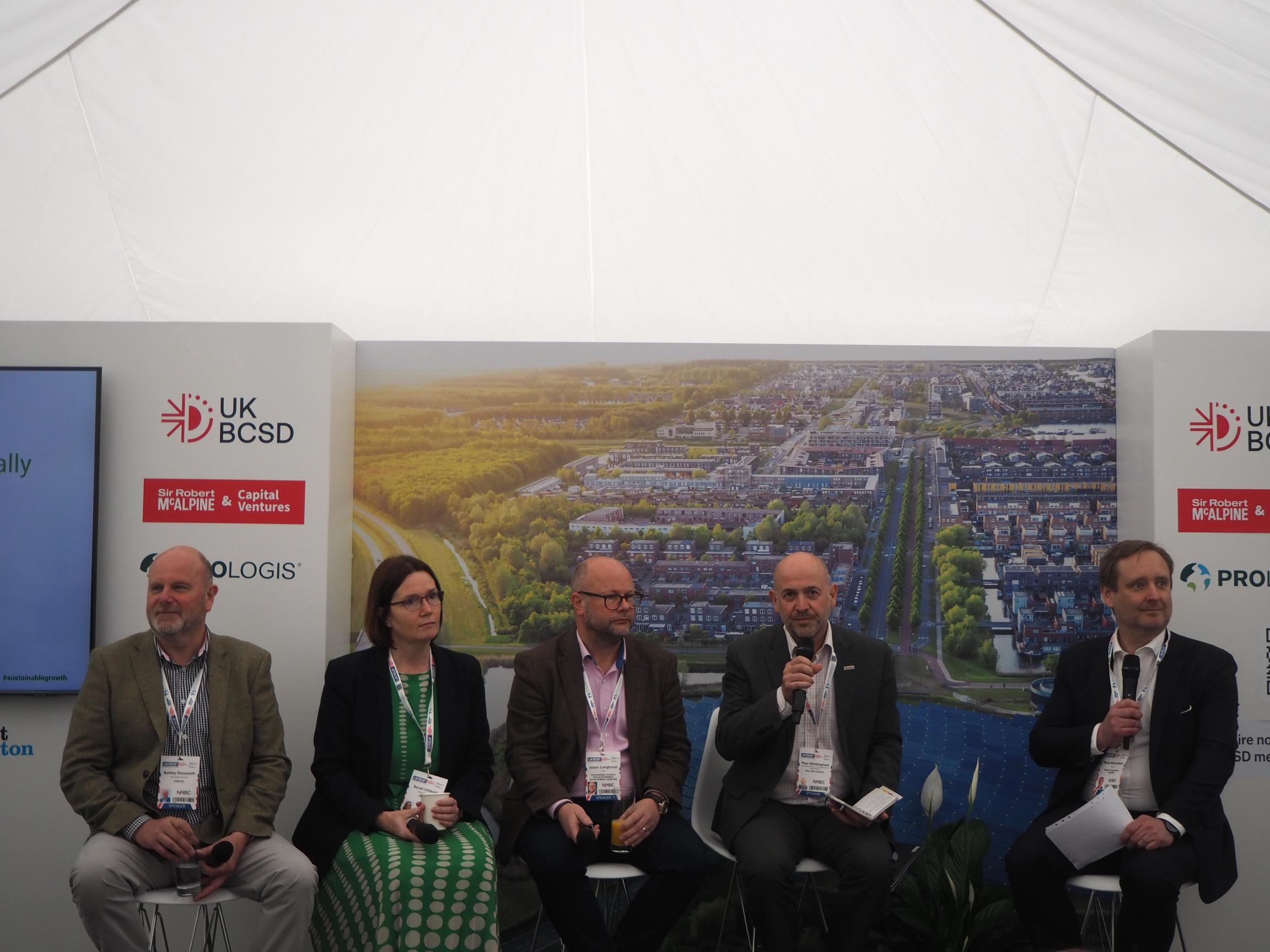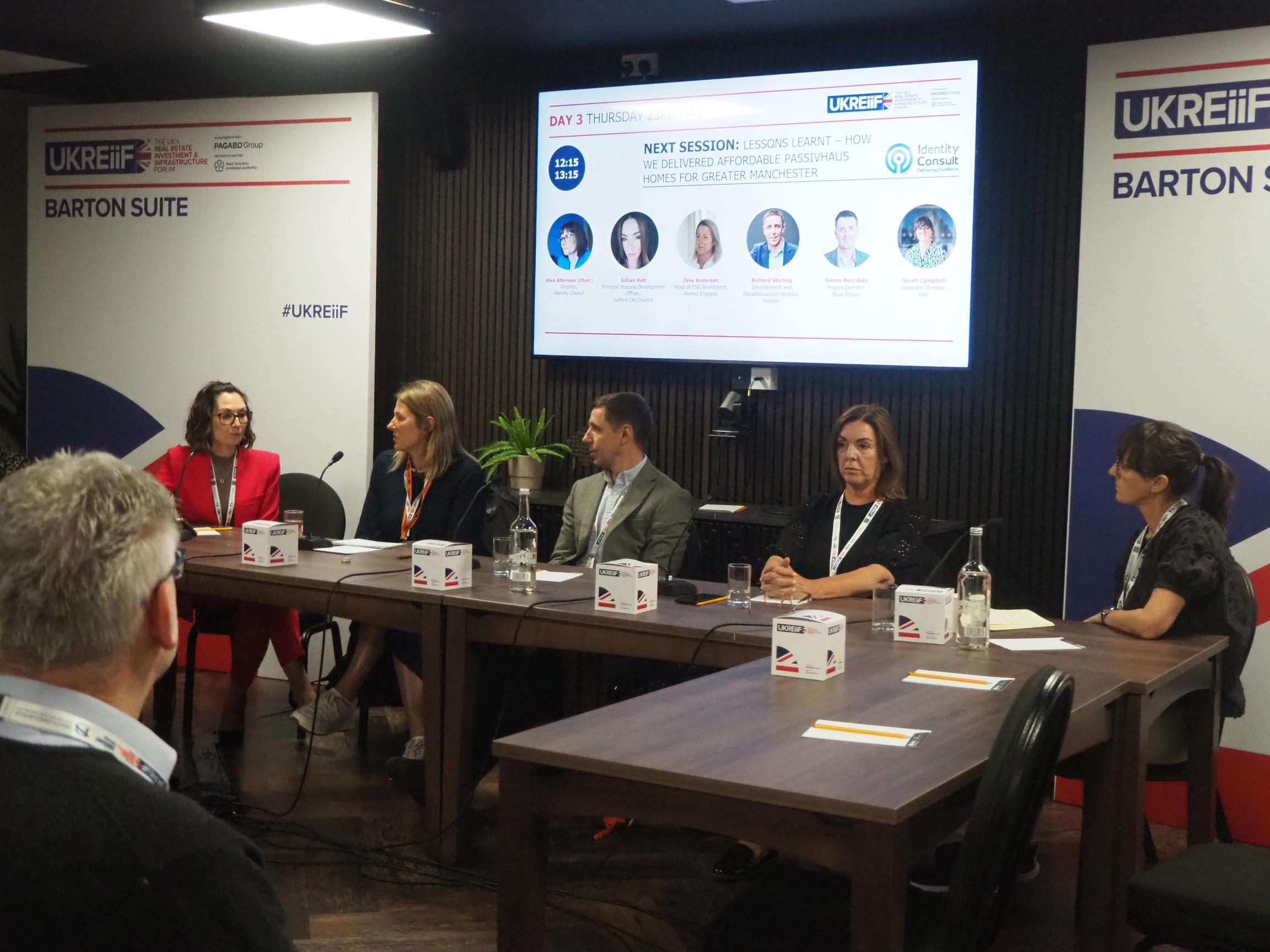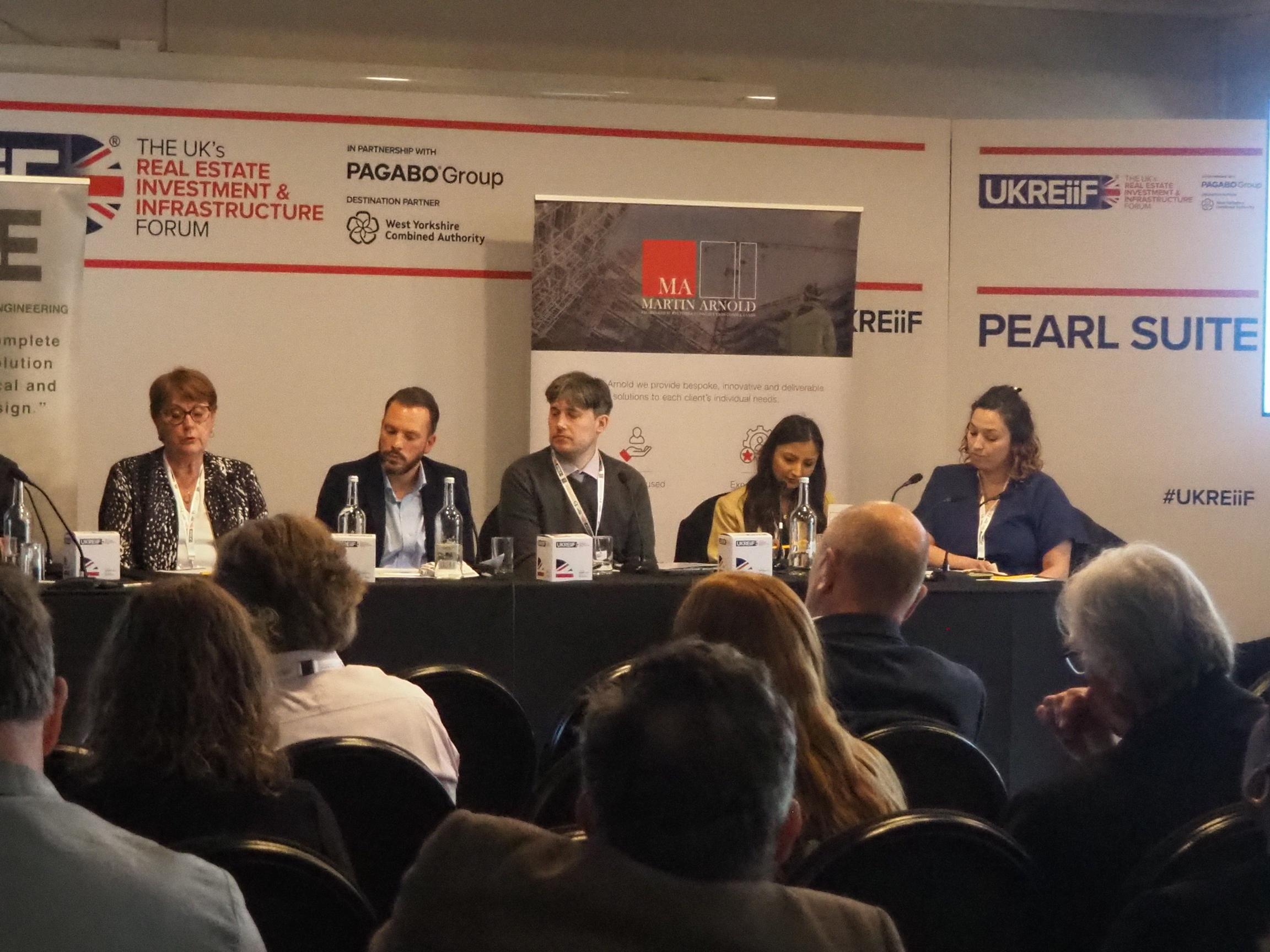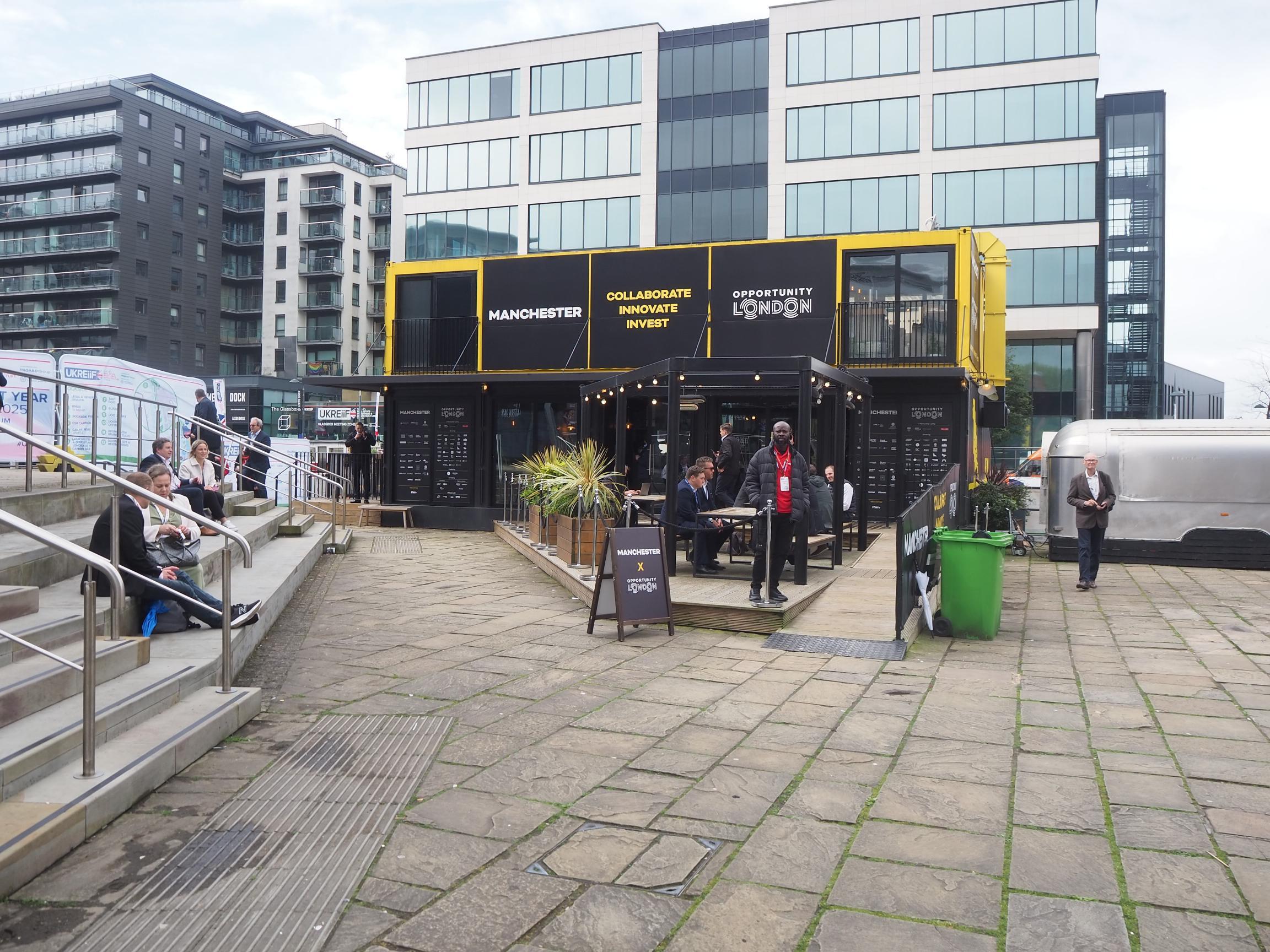Manchester @ UKREiiF 2024 Day Three Roundup
A roundup of all of the action from the Greater Manchester Delegation on Day Three of UKEREiiF 2024, Thursday 23rd May.
Today marked the final day of UKREiiF 2024 and the end of a hugely productive conference in Leeds. Over the past 3 days many conversations were had and introductions made that could shape the future of our city-region, as Greater Manchester showcased its vision for the future to thousands of property professionals.
Sharing our stand with Opportunity London has strengthened the relations between the UKs two leading cities and has opened up conversations around collaboration in placemaking.
Once again, representatives from Greater Manchester’s delegation were, networking and featuring on panel sessions to share their expertise, this time on topics such as clean growth, affordable homes and even the future of building safety.
Here is a roundup of all Greater Manchester’s activity from Day Two of UKREiiF 2024.

The day began with “Show Stoppers Unplugged – What is Really Holding Back Clean Growth?” over on the Sustainable Growth Pavilion. Paul Whittingham Assistant Director Development & Regeneration, Bolton Council joined Hannah Bronwin Executive Director, SSE Thermal and chair, Mark Richardson Partner, Troup Bywaters + Anders LLP to discuss barriers to clean growth including planning and engagement and what the next government could do to improve ambitions to net zero. Paul Whittingham gave an overview of Bolton’s heat zone and alternated transport ambitions, the new Mayoral Development Corporation, and plans for Health Innovation Bolon. He also discussed the importance of bringing everything together to plan for the future.
Paul Whittingham said “In Bolton we’re creating a 3D map that tells people what is coming in the future and how we can create a green future, its never been done before, “it will show people why they should invest.
We need to accelerate the ability to bring schemes forward, make it easier to get things into the planning portal and make those decisions. The whole basis is placemaking with people not to people, that’s the purpose of the 3D map, to allow people to walk through and post notes onto plans in real life. We can use it as a form of consultation to take to the planning committee.”
In the Barton Suite, Gillian Holt Principal Housing Development Officer, Salford City Council joined “Lessons Learnt – How We Delivered Affordable Passivhaus Homes for Greater Manchester”. Alongside Gillian was representative from Homes England, PRP, Muse Places and Seddon.
The panel discussed Salford’s Greenhouse project with is the largest Passivehaus social housing scheme in the North West creating 96 affordable homes. Passive House is a building standard that is truly energy efficient, comfortable and affordable at the same time. The project aimed to tackle the shortage of affordable homes in the borough while creating futureproof, high-quality dwellings in this space.

Gillian Holt said “Greater Manchester declared a climate emergency in 2019 and has a target to be carbon neutral by 2038. As we had a target to build social housing in Salford, we felt it was a good opportunity to be a bit ahead of the game. One of the reasons we chose Passivhaus was because we could certify it, make sure everything was checked and up to a certain standard.
“Because we’re building social homes, most of our customers are in energy stress. They also have health conditions which can be related to poor living conditions, and Passivhaus has less risk of damp and mould.
“From a social and affordable point of view, because were renting them out the Passivhaus badge isn’t as important, but as we’d never done this before, we needed to go through this process to get the learning that we can use in the future as the Salford standard.”
Over on the Sustainable Futures Pavilion, Clare Mendelle, Legal Director at Addleshaw Goddard joined the conversation “Public Private Partnerships – Looking to the Future and Learning From the Past”. Other panellists included representatives from AtkinsRealis, Leeds City Council Equitix and Grant Thronton.

The panel discussed Private Finance Initiatives (PFI), long-term contracts between a private party and government entity in the built environment. They talked about the importance of finding the right people to work with to deliver and the importance of establishing these projects for the long term to meet future infrastructure needs.
In the Workshop Room, Bethany Adams head of Purpose and Impact at Bruntwood joined “Bottom Up Community Led Regeneration – Taking Action From Case Studies” with Judi Greenwood Head of Networks at Future of Greater Manchester and John Nordon Creative Director of igloo Regeneration.
Finally, over in the Pearl Suite, Georgina Williams Principle Fire Engineer at Hydrocks joined “Enhancing Building Safety: Delivering Cladding Remediation under the Building Safety Act”. The panel discussed the building safety act and what it meant for high-rise and vulnerable buildings, what we could learn from past failings and why change hasn’t been implemented sooner. They debated what needed to be changed in the industry to create a more holistic approach to safety and the importance of community engagement when implementing new safety measures for them to be effective.

On collecting data and insight around fire safety, Georgina Williams said “The first thing we need is knowledge. Whenever we start these projects we need far much more knowledge than we think, but we can collaborate on this and collate the information in a better way.
“One of the things I think we need to push for in the UK is better quantification of risk. There are so many people that need the info we need to be better as an industry at how we make sure everyone can access it, and not everyone is a fire safety expert.
“The way technology is advancing there has to be a way to collate this information and ensure everyone who needs this information can access it in a way they can understand.
“People need to be far more careful in choosing suppliers than they are. Not all suppliers want to share information with you and if you end up chasing and chasing it you may find later in the design that they don’t have the certificates you need or it hasn’t been tested in the way you’ve designed it. If you’re approaching suppliers, challenge them on how upfront they are sharing information.”

And that concludes Greater Manchester’s time at UKREiiF 2024. It’s been a brilliant conference with representatives from the region able to discuss a wide variety of topics alongside opportunities for connecting and discussing future projects.
We’d like to say a huge thanks to UKREiiF and The Canary Bar for hosting us once again, as well as Opportunity London for partnering with us and successfully showcasing the strength of collaboration between two leading city-regions.
Thank you to all of our partners and local authorities for joining us at UKREiiF and helping to make this event a success, and coming together to share your ambitions for the future of Greater Manchester.
Thanks to all of our speakers for joining engaging panels and sessions, sharing your insights has helped show Greater Manchester as a forward-thinking city-region and a driving force for change.
We’re already beginning to plan for UKREiiF 2025, and we’re looking forward to our next Manchester Invest Partnership event LREF in September.
To learn more about joining the Manchester Invest Partnership, contact our team.